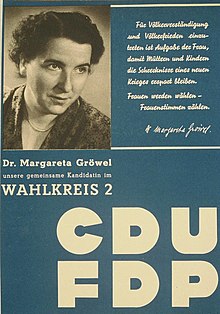Margarete Gröwel
Margarete Gröwel (born August 14, 1899 in Hamburg , † January 20, 1979 in Salzburg ) was a German politician of the Center Party and the CDU .
Life
Gröwel first completed a teacher training and worked at a Catholic school in St. Georg . After the Catholic schools in Hamburg were closed in 1934, she studied philology, history, ethnology and philosophy at the University of Hamburg . It was then when Georg Thilenius to Dr. phil. PhD , in her dissertation she wrote about the educational problems of Indian children in the United States . After completing her doctorate, she passed the exam and then worked at the Institute for Teacher Training. She also taught at a secondary school in Hamburg. On August 22, 1944, as an avowed Christian and Nazi opponent, she was arrested after the assassination attempt on Hitler as part of the Gewitter campaign , as were many other former Weimar politicians from democratic parties, and taken to the Fuhlsbüttel concentration camp , known as Kola-Fu . However, she was released on August 29, 1944. After the end of the Second World War , she worked in the library of the Hamburg Museum of Ethnology . In 1953 she became the first woman in the German consular service to be consul in Houston . She tried to promote trade relations between West Germany and the American Southwest. After her time in Houston, she worked in the same position in Liège from 1962 to 1964 .
Since her marriage to the Austrian engineer Maximilian Sztollar in 1953, she was called Sztollar-Gröwel.
Political party
Gröwel joined the Center Party in 1924 and was Hedwig Fuchs' political foster daughter . Until 1933, Gröwel was active for the center, the Association for Germanness Abroad VDA , the Windthorstbund and the Association of Catholic German Teachers VKDL in Hamburg. In 1939 she moved to the NSLB .
After the war she was a co-founder of the CDU Hamburg , of which she was a member until 1953. When the CDU was negotiating participation in the government in Hamburg after the state elections in 1946, it was in discussion alongside Ascan Klée Gobert and Gerd Bucerius as President of the Cultural Authority. In October 1950 she was elected a member of the board of the CDU in Germany at the first federal party conference in Goslar .
MPs
At the first general election in 1949 it was as a result of an election agreement as a joint candidate of the CDU and FDP in the constituency Hamburg IV elected to parliament, where it is especially the women's issues turned and was chairman of the Library Committee of the Bundestag. She headed the CDU women's working group and was a member of the advisory board of the German headquarters of the World Organization of Mothers of All Nations (WOMAN). At the end of the legislative period, she resigned from both the Bundestag and the CDU federal executive board to go to the United States as a consul .
Honors
- 1965: Cross of Merit 1st Class of the Federal Republic of Germany
Works
- Posture and upbringing of the child among the North American Indians. Evert, Hamburg 1937 ( dissertation , University of Hamburg).
literature
- G. Letter, B. Kaff, H.-O. Kleinmann: Christian Democrats against Hitler . Published on behalf of the Konrad-Adenauer-Stiftung eV, Verlag Herder Freiburg im Breisgau, 2004, ISBN 3-451-20805-9 ; Pp. 227-231.
- Helmut Stubbe da Luz : Gröwel, Margareta . In: Franklin Kopitzsch, Dirk Brietzke (Hrsg.): Hamburgische Biographie . tape 5 . Wallstein, Göttingen 2010, ISBN 978-3-8353-0640-0 , p. 154-156 .
- Rudolf Vierhaus , Ludolf Herbst (eds.), Bruno Jahn (collaborators): Biographical manual of the members of the German Bundestag. 1949-2002. Vol. 1: A-M. KG Saur, Munich 2002, ISBN 3-598-23782-0 , p. 281.
Web links
Individual evidence
- ↑ Helmut Stubbe da Luz : Union of Christians - splinter group - integration party. Roots and beginnings of the Hamburg CDU until the end of 1946. Dissertation, University of Hamburg, 1990.
- ↑ Helmut Stubbe da Luz: Margareta Gröwel. In: Günther Buch u. a. (Ed.): Christian Democrats against Hitler: From persecution and resistance to the Union. Herder, Freiburg 2004, ISBN 3-451-20805-9 , p. 227.
- ↑ Christof Brauers: The FDP in Hamburg 1945 to 1953. M-Press Meidenbauer, Munich 2007, ISBN 978-3-89975-569-5 , p. 271.
| personal data | |
|---|---|
| SURNAME | Groewel, Margarete |
| ALTERNATIVE NAMES | Groewel, Margareta; Gröwel, Margaretha; Gröwel-Sztollar, Margarete; Gröwel-Sztollar, Margaretha |
| BRIEF DESCRIPTION | German politician (center, CDU), Member of the Bundestag |
| DATE OF BIRTH | August 14, 1899 |
| PLACE OF BIRTH | Hamburg |
| DATE OF DEATH | 20th January 1979 |
| Place of death | Salzburg |
